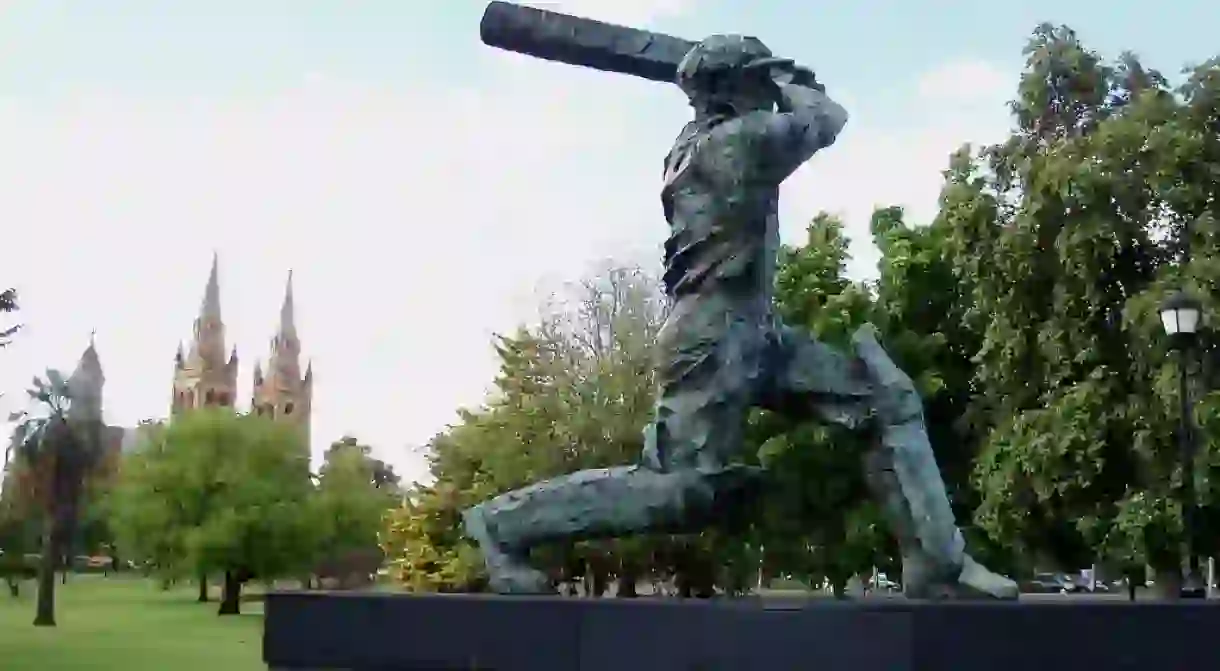10 Australian Sporting Legends

Australia loves sport. Like, really loves it. People often say that besides the prime minister, the captain of the Australian cricket team is the most powerful person in the country… and they’re not entirely joking. So who are the sporting icons Australians idolise above all overs? Start with these 10 champions.
Don Bradman
Michael Jordan, Wayne Gretzky, Usain Bolt, Michael Phelps — forget ‘em. No person has ever dominated their sport more than Sir Donald Bradman, who is without a scintilla of doubt the greatest cricketer of all time. To give you an insight into how peerless Bradman is, he averaged 99.94 runs per innings over his 20-year Test match career spanning 1928-1948, acres ahead of the next best average of 61.87. Known simply as ‘The Don’, Bradman’s standing in Australian society extended way beyond cricket, and he was farewelled with a lavish state funeral when he passed away in 2001 aged 92.

Ron Barassi
There are 27 ‘Legends’ in the Australian Football Hall of Fame, but the first to be inaugurated was Barassi, Aussie rules’ greatest identity. Ron was just five years old when his father — himself a champion footballer for Melbourne — was killed serving the army in North Africa in 1941, then followed in Ronald Senior’s footsteps when he debuted for the Dees as a 17-year-old in 1953. The career that developed is fairytale stuff, winning six premierships with Melbourne and Carlton as a player over 254 games between 1953 and 1969, then four more flags across a three-decade coaching career that spanned four clubs.
Rod Laver
Australia is blessed with a galaxy of tennis icons — John Newcombe, Evonne Goolagong, Ken Rosewall, Margaret Court, Pat Cash, Lleyton Hewitt and Pat Rafter to name a few — but Laver’s star shines the brightest. The ‘Red-headed Rocket from Rockhampton’ netted 200 singles titles, including 11 Grand Slams and the distinction of being the only man to win the calendar-year Grand Slam twice, in 1962 and 1969. Laver’s legend was enshrined in 2000 when centre court at the Australian Open was renamed Rod Laver Arena.

Shane Warne
‘Warnie’ is Australia’s answer to Diego Maradona: an utterly brilliant athlete who’s a little fuller in figure and no stranger to headline-grabbing extra-curricular activities away from the sporting arena. Warne’s 708 wickets over a glittering 15-year Test match career between 1992 and 2007 don’t adequately capture the cult of personality that surrounded the cigarette-smoking, beer-loving, baked beans-eating laid-back blond Victorian; the quintessential Aussie larrikin who the public adore.

Greg Norman
How could we not include an Aussie legend nicknamed ‘The Great White Shark’ on this list? Norman infamously lacked killer instinct at the 1996 Masters — when he squandered a six-shot lead in the final round to surrender the coveted green jacket to Nick Faldo — but one of sport’s all-time epic meltdowns shouldn’t overshadow one of golf’s great careers. The Shark spent 331 weeks on top of the world rankings — longer than any man besides Tiger Woods — and bagged 91 tournaments over a golden stretch through the 1980s and ‘90s.
Cathy Freeman
If you look up the word ‘pressure’ in an Australian dictionary, there’s a picture of Cathy Freeman in her iconic body suit at the start line of the 400m final at the Sydney 2000 Olympics with the weight of a nation on her shoulders. Of course, Freeman collected gold that night, cementing her name in Australian sporting folklore with arguably the country’s most celebrated Olympic moment, then capped the occasion by running a victory lap draped in both the Aboriginal and Australian flags to recognise her proud Indigenous heritage.

Ian Thorpe
Australia’s other hero of those 2000 Games was a 17-year-old kid with size 17 feet by the name of Ian Thorpe, who collected three gold medals and two silvers in the pool at his home-town Olympics. Another two golds at the 2004 Athens Olympics took his total tally to five — the most won by any Australian — but his legend status grew even larger in 2014 when he publicly confirmed he was gay, using his standing as one of Australia’s greatest sportsmen to help destigmatise sexuality.

John Eales
This icon of Australian rugby union was nicknamed ‘Nobody’… because nobody’s perfect. It would be hard to find a more respected figure in Australian sport than Eales, who won two Rugby World Cups — in 1991 then in 1999 as captain — over a 10-year career in the famous gold jumper between 1991 and 2001. Post-rugby, Eales has run his own sports marketing and events company, founded a culture and leadership consultancy, and been a director of various companies — gee whiz, this dude really is perfect.
Steven Bradbury
You know you’ve made it as an Aussie sporting legend when your name enters the national vernacular. Ever since the short track speed skater snatched the most unlikely gold medal at the 2002 Salt Lake City Winter Olympics when his four rivals in the final fell over just before the finish line, ‘doing a Bradbury’ has referred to a win by default that’s achieved with a generous dollop of good luck, when everyone else crashes out to leave just one competitor standing to collect the prize.
Arthur Beetson
This rugby league legend is known for many things: being the greatest ball-playing forward in history, leading Eastern Suburbs to exalted back-to-back premierships in 1974 and ’75, once eating 11 hot dogs at a formal dinner to live up to his nickname of ‘Meat Pie Artie’, referring to his ‘husky’ frame. But Beetson’s greatest achievement was becoming the first Indigenous person to captain Australia in any sport, a distinction he earned between 1973 and 1977. Artie was anointed an ‘Immortal’ of rugby league in 2004 before sadly dying of a heart attack in 2011, aged 66.













